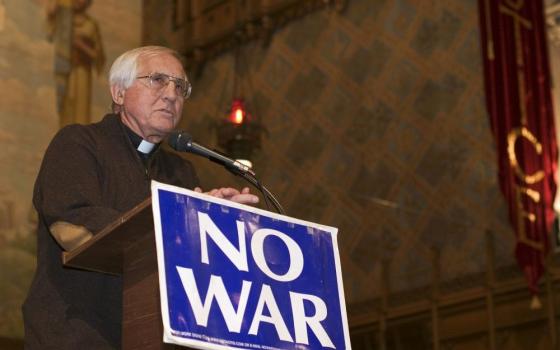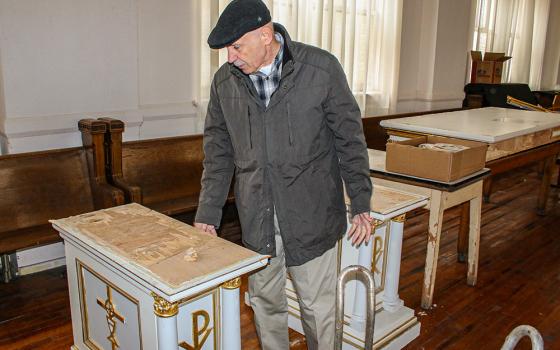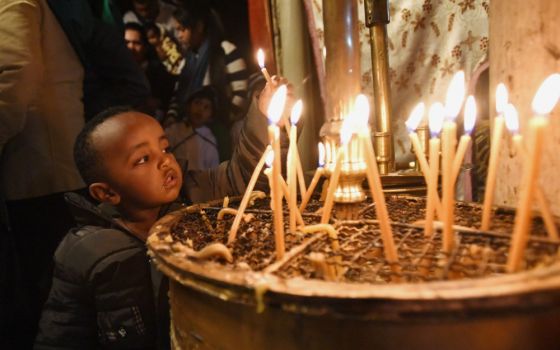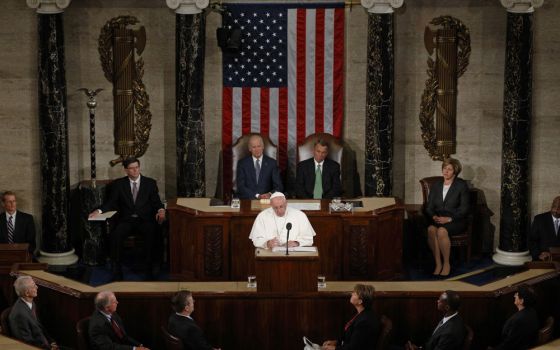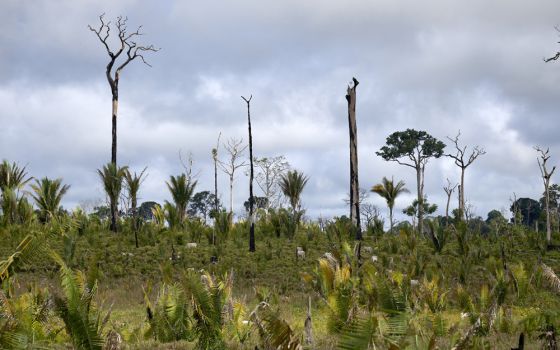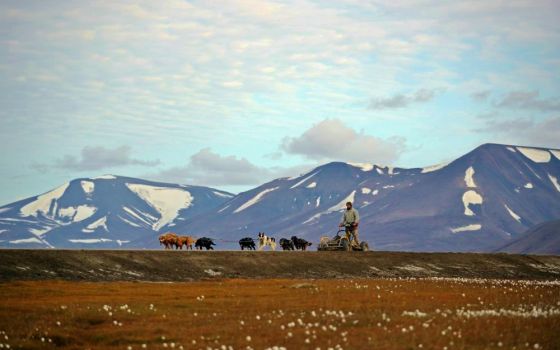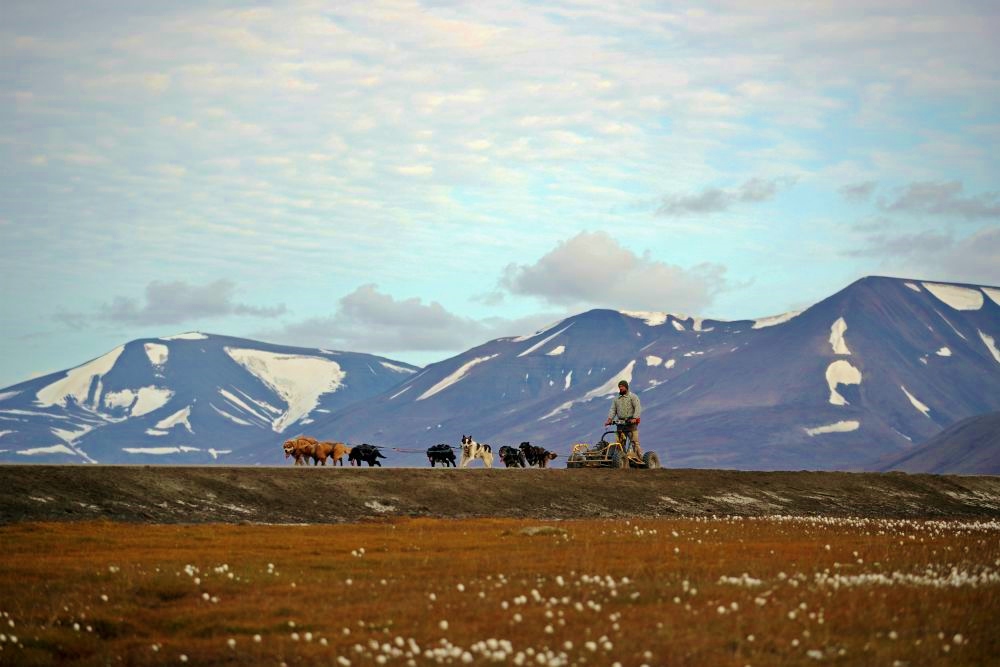
Husky dogs pull a rig and musher Audun Salte through the town of Longyearbyen in Svalbard, Norway, Aug. 6. Salte worries that as temperatures warm, climate change could lead to the extinction of all life on Earth. (CNS/Reuters/Hannah McKay)
Editor's note: NCR is sharing Advent reflections based on "Laudato Si': on Care for our Common Home," by former NCR editor and publisher Arthur Jones. These were originally published in 2015 by St. Vincent de Paul Parish Community in Baltimore. He wishes to acknowledge the inspiration of the Celtic invocations of Alexander Carmichael's Carmina Gadelica. We'll publish his reflections for Weeks 2, 3 and 4 on Dec. 8, 15 and 22.
Sunday, Dec. 1: God's loving plan
The Genesis accounts of creation, the pope suggests, contain profound teachings about human existence and its historical reality … human life grounded in three fundamental and closely intertwined relationships: with God, with our neighbor, with the Earth itself. If we are truly concerned to develop an ecology capable of remedying the damage we have done, no branch of science and no form of wisdom can be left out, and that includes religion and the language peculiar to it. If the simple fact of being human moves people to care for the environment, Christians in their turn "realize that their responsibility within creation, and their duty toward nature and the Creator, are an essential part of their faith." This provides "ample motivation to care for nature and for the most vulnerable of their brothers and sisters."
The pope writes that in the Judeo-Christian tradition the word "creation" encompasses God's "loving plan" that endorses every creature's own value and significance … creation understood as a gift from the outstretched hand of the Father of all to all.
Can I accept that I, too, am expected to stretch out my hand toward living things, even down to micro-organisms, even if it is only to recognize their existence for the first time, with a promise to find ways to learn more about each organism's and creature's "own value and significance?" Can I make myself care, where previously I never — or scarcely — noticed?
O God, let me cultivate ecological virtues.
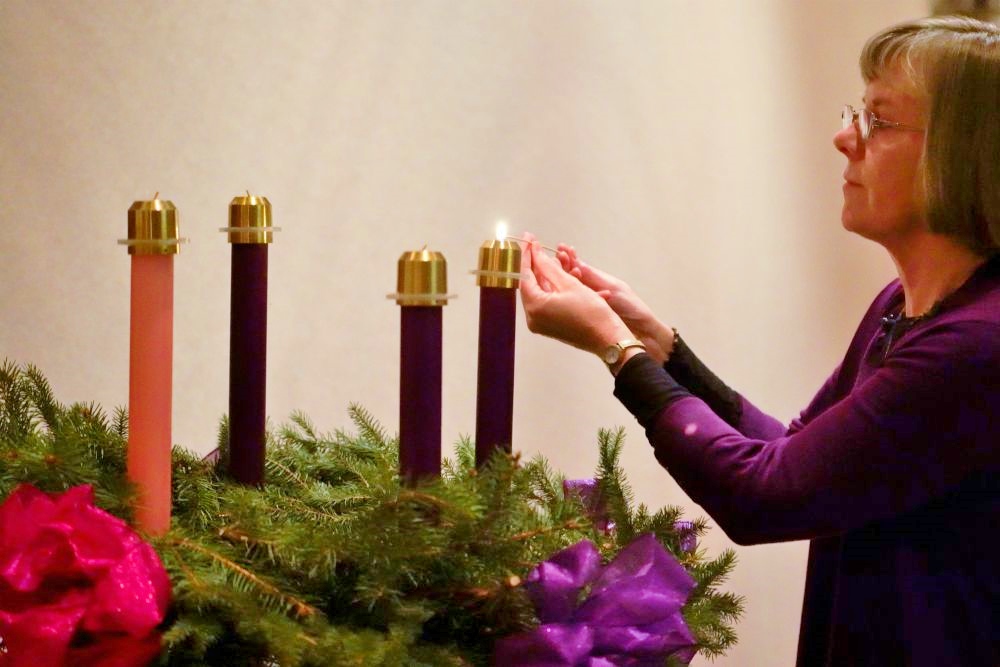
Benedictine Sr. Jennifer Mechtild Horner, prioress of the Sisters of St. Benedict of Beech Grove, Indiana, lights the first candle of the Advent wreath Dec. 1, 2018 at the Our Lady of Grace Monastery. (CNS/Katie Rutter)
Monday, Dec. 2: Integral ecology
We need now a gentler source for reflection as we join Pope Francis' own spiritual journey into the issues of integral ecology, the blending of human life with all life.
We also need to think up new ways of blending our lives with other humans lives that we interact with in ways we perhaps do not consider: a prayer for the pickers of the produce we are preparing to serve, a prayer for the person in Bangladesh who made that top or shirt.
Francis quotes his namesake saint to remind us our common home, Mother Earth, is like a sister with whom we share our life. "This sister now cries out to us because of the harm we have inflicted on her by our irresponsible use and abuse of the goods with which God has endowed her. We have come to see ourselves as her lords and masters, entitled to plunder her at will."
Francis has a poetic side, a realist poetic side to his mode of expression. It makes what he says very easy to digest most of the time:
The violence present in our hearts, wounded by sin, is also reflected in the symptoms of sickness evident in the soil, in the water, in the air and in all forms of life. That is why the earth herself, burdened and laid waste, is among the most abandoned and maltreated of our poor' she "groans in travail" (Rom 8:22).
If I, as an individual, have been mindless at times in my treatment of the Earth and living things, it is also true, the pope writes, "the Judeo-Christian thinking, on the basis of the Genesis account … has encouraged the unbridled exploitation of nature … . [and] it is true we Christians have at times incorrectly interpreted the Scriptures … ."
"Judeo-Christian thought demythologized nature. While continuing to admire its grandeur and immensity, it no longer saw nature as divine."
"Faith allows us to interpret the meaning and the mysterious beauty of what is unfolding."
"We must forcefully reject the notion that our being created in God's image and given dominion over the earth justifies absolute domination over other creatures."
We are not nature's owners, in the same way we are not the owner of other people. Our connection to others, and to living things and the natural order, has to do with right relationships.
Do I overlook the smaller acts in my life that, based in convenience, or selfishness, perhaps even vanity, might divert my attention from what is essential not only to sustain my life, but the life of all living things?
O God, let me cultivate ecological virtues.
Tuesday, Dec. 3: Lift up your eyes
Francis is willing us to pay more attention to everything around us, and he brings in Jesus' eye for detail to emphasize the point.
"The Lord was able to invite others to be attentive to the beauty that there is in the world because he himself was in constant touch with nature, lending it an attention full of fondness and wonder. As he made his way throughout the land, he often stopped to contemplate the beauty sown by his Father, and invited his disciples to perceive a divine message in things: "Lift up your eyes, and see how the fields are already white for harvest" (Jn 4:35). "The kingdom of God is like a grain of mustard seed which a man took and sowed in his field; it is the smallest of all seeds, but once it has grown, it is the greatest of plants" (Mt 13:31-32).
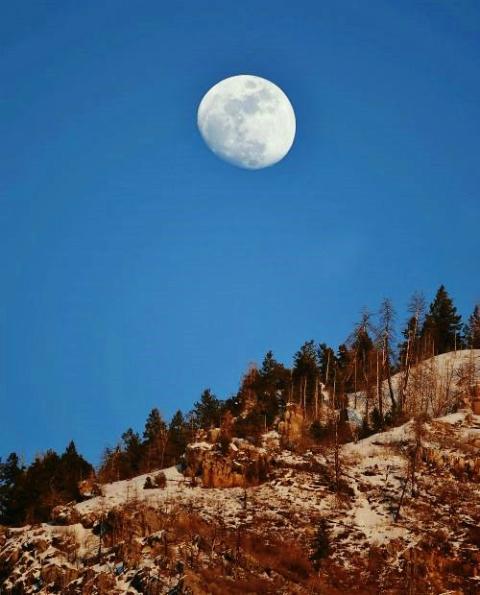
Y Mountain near Provo, Utah, 2018 (CNS/George Frey)
He continues:
Jesus lived in full harmony with creation, and others were amazed: "What sort of man if this that even the winds and sea obey him" (Mt 8:27). His appearance was not that of an ascetic set apart from the world, nor of an enemy to the pleasant things in life. Of himself he said: "The Son of Man came eating and drinking and they say, 'Look, a glutton and a drunkard!' " (Mt 11:19). … In the Christian understanding of the world, the destiny of all creation is bound up with the mystery of Christ, present from the beginning: "All things have been created through him and for him" (Col 1:16).
You, God, took a chance with creation. As you look now on creation and see how much it is despoiled, even after your Son redeemed humankind, is your creation more threatened than fulfilled? I should take some actions on Mother Earth's behalf.
O God, let me cultivate ecological virtues.
Advertisement
Wednesday, Dec. 4: Desolation and filth
The pope writes that theological and philosophical reflections on the situation of humanity and the world can sound tiresome and abstract unless they are grounded in fresh analysis of our present situation, which is in so many ways unprecedented in the history of humanity… now coupled to "a period of irrational confidence in progress and human abilities" while coupled with "a more intensified pace of life and work which might be called 'rapidification.' "
Francis is unsparing in his assessment and his criticism regarding the pollution and waste that produce "a broad spectrum of health hazards, especially for poor" closely linked "to the throwaway culture" and "pollution that affects everyone, caused by transport, industrial fumes, substances which contribute to the acidification of soil and water, fertilizers, insecticides, fungicides, herbicides and agrotoxins in general. Technology, which, linked to business interests, is presented as the only way of solving these problems, in fact proves incapable of seeing the mysterious network of relations between things and so sometimes solves one problem only to create others."
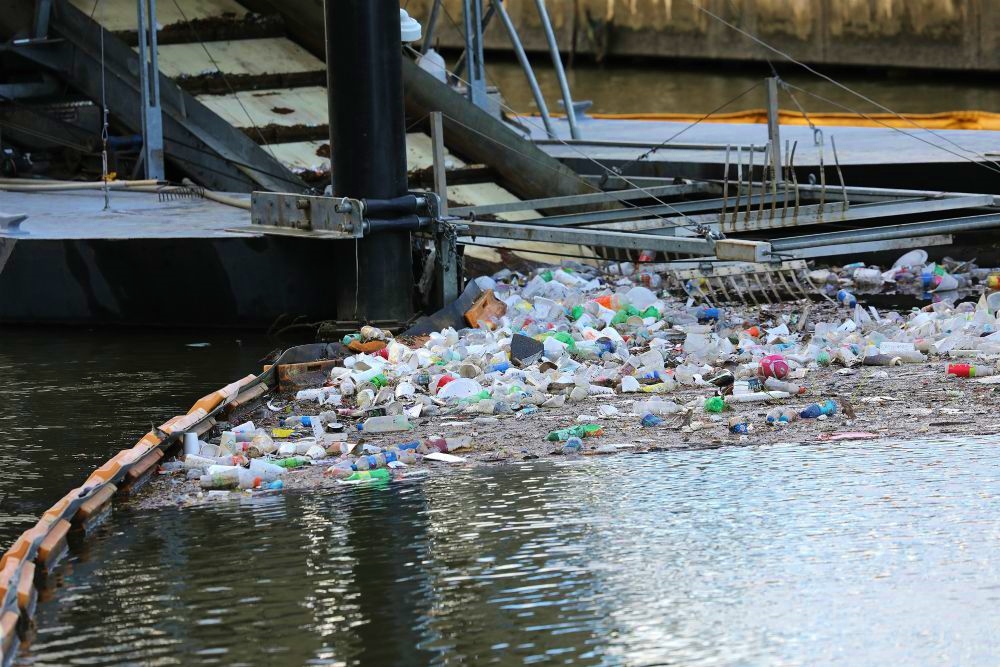
A worker collects trash in a containment along Baltimore's Inner Harbor June 11. (CNS/Bob Roller)
When the pope says "the elderly lament that once beautiful landscapes are now covered with rubbish," he is also speaking for himself. He lived in one of the world's most populous cities, a city in the Southern Hemisphere, Buenos Aires, Argentina, a city of 12 million people. And yet, while the city's name can mean "fair winds" or "good air," Francis is well acquainted with the fact that good air and fair winds in Buenos Aires are a benefit enjoyed by the rich.
The city, a seething heap of poverty below with great wealth above, is a typical mega-city of the developing world. The disgusting Riachuelo River basin, where the city meets the ocean, is one of the most polluted in the world, filled with the plasticized detritus, the filth and the effluence of the city's 12 million people and the slums bordering the river basin itself.
In these cities, are we also looking at a symbol of the future direction of many cities in the developed world as the money for infrastructure needs is instead privatized and diverted into technological "fixes" that fix nothing, or personal aggrandizement and profits that defraud the common good?
"Doomsday predictions can no longer be met with irony or disdain," Francis writes, "… leaving to coming generations debris, desolation and filth.
"The pace of consumption, waste and environmental change has so stretched the planet's capacity that our contemporary lifestyle, unsustainable as it is, can only precipitate catastrophes, such as those which even now periodically occur in different areas of the world."
I have to be able to able to accept the pope's broad sweep of problems — with still many more ahead to be discussed — without becoming overwhelmed or feeling helpless. Perhaps if I initially focus more closely on the privilege of the everyday things I have, such as music, a warm coat, a comfortable bed, my car, my electronics, I can build from there.
O God, let me cultivate ecological virtues.
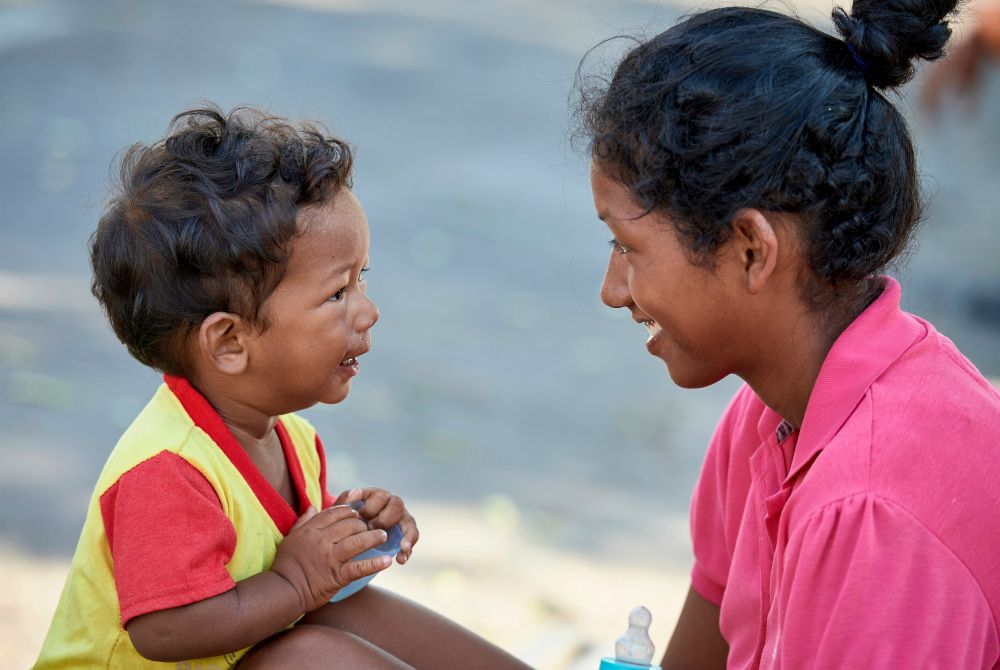
Venezuelan refugee family members in the Amazon talk April 2 after receiving food and other emergency support from the Consolata Missionary Sisters in Boa Vista, Brazil. (CNS/Paul Jeffrey)
Thursday, Dec. 5: Defending human dignity
"Although change is part of the working of complex systems," Francis writes, "the speed with which human activity has developed contrasts with the naturally slow pace of biological evolution. Moreover, the goals of this rapid and constant change are not necessarily geared to the common good or to integral and sustainable human development."
Later:
At times we see an obsession with denying any pre-eminence to the human person; more zeal is shown in protecting other species than in defending the dignity which all human beings share in equal measure. Certainly, we should be concerned lest other living beings be treated irresponsibly. But we should be particularly indignant at the enormous inequalities in our midst, whereby we continue to tolerate some considering themselves more worthy than others. We fail to see that some are mired in desperate and degrading poverty, with no way out, while others have not the faintest idea of what to do with their possessions, vainly showing off their supposed superiority and leaving behind them so much waste which, if it were the case everywhere, would destroy the planet. In practice, we continue to tolerate that some consider themselves more human than others, as if they had been born with greater rights.
At times, do I, perhaps just a little bit, feel a tad superior to someone else? Superior to a particular type of person, or group? Even fleetingly? Is feeling too fondly my own distinct worth one more thing that separates me from you, God, in this hurried "rapidified" world? Is the fleeting feeling of being a little bit better than someone else (if it exists) somehow connected to something I possess — a product, a gift, an education? Is it a result of the time I spend caring for or worrying about possessions I may not even need?
O God, let me cultivate ecological virtues.
Friday, Dec. 6, 2019: Climate change
Francis writes with particular emphasis at this moment on air, water and forests:
"Caring for ecosystems demands far-sightedness because no one looking for quick and easy profit is truly interested in their preservation. … Some countries have made significant progress in establishing sanctuaries in oceans and on land where human intervention is prohibited … ."
And:
"The climate is a common good belonging to and meant for all… . Climate change is a global problem with grave implications: environmental, social, economic, political and for the distribution of goods."
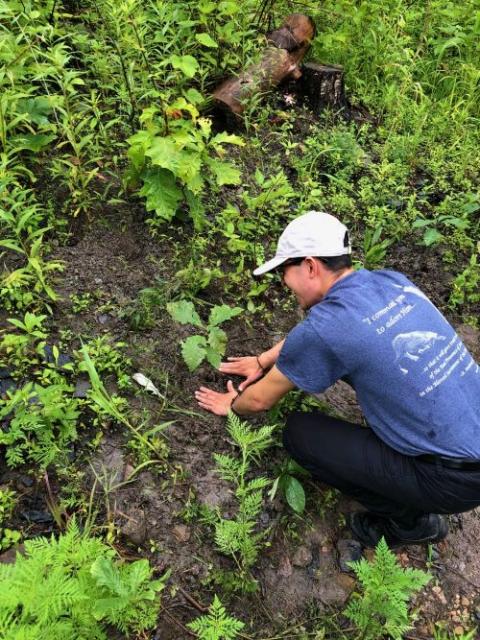
Jason Warrer, a Conventual Franciscan friar in formation, plants an oak tree in the Robinson Forest in eastern Kentucky in June as part of a reforestation effort on land being reclaimed from the effects of mountain top removal coal mining. (CNS/Courtesy of Franciscan Friars Conventual)
Warming has effects on the carbon cycle. … most global warming in recent decades is due to the great concentration of greenhouse gases (carbon dioxide, methane, nitrogen oxides and others) released mainly as a result of human activity. … Carbon dioxide pollution increases the acidification of the oceans and compromises the marine food chain. … A rise in the sea level, for example, can create extremely serious situations if we consider that a quarter of the world's population lives on the coast or nearby, and that the majority of our megacities are situated in coastal areas.
Climate change … represents one of the principle challenges facing humanity … . Many of the poor live in areas particularly affected by phenomena related to warming, and their means of subsistence are largely dependent on natural reserves and ecosystemic services such as agriculture, fishing and forestry. …Let us [also] mention, for example, those richly biodiverse lungs of our planet, the Amazon and Congo basins …" that are important "for the entire earth and the future of humanity. The ecosystems of tropical forests possess an enormously complex biodiversity which is almost impossible to appreciate fully … ."
As I reflect on these things and then attempt to meditate — in order to allow a wholesome understanding and appreciation to well-up inside me, even without specificity, I realize that in the West I live in a cocoon, a gilded cocoon. Yet I must leave my cocoon, to help those who are or who can be exploited, to assist those elements of Mother Earth that can be exploited, while caring for people and elements that have no choice without me.
I really, really do need to help the environment, for it, in the final analysis, is the co-helper that gives us life. Readying myself, by assessing my place in creation, is readying me to be your voice, God, on behalf of rectifying the degradation Francis points to. By doing more for the environment and the threatened peoples of the world, I can ask you to look on me. Even so, I am afraid. "Fear not" (John 12:15).
O God, let me cultivate ecological virtues.
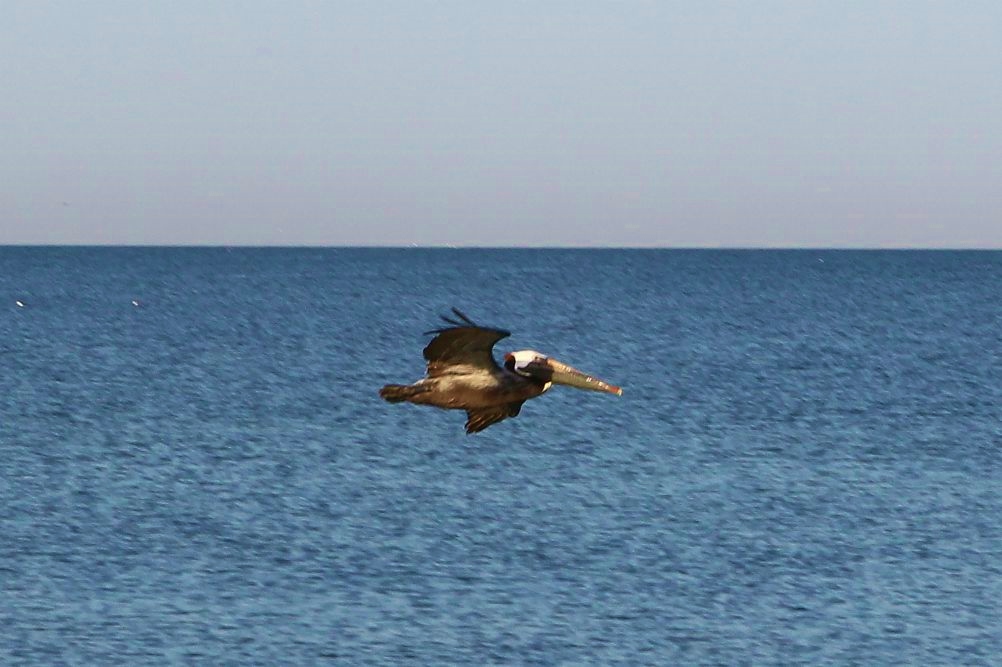
A pelican flies along the shoreline in Belleair Beach, Florida, April 9. (CNS/Bob Roller)
Saturday, Dec. 7: Awe and wonder
With this encyclical, the pope is attempting several things at once. Essentially he is trying to educate the global peoples regarding the world's plight. Next, he wants to embolden us to act. Then, not exclusively for Christians, he wants to reveal the connections between education-emboldening and the spiritual content of the integral ecology. He is trying to make the world aware of the essential spiritual gifts contained in non-human life. To explain, we return once more to the theme of increased "rapidification" that distracts us from concentrating on essentials and detracts quality from life.
Understandably, Pope Francis again relies on St. Francis, who:
helps us to see that an integral ecology calls for openness to categories which transcend the language of mathematics and biology, and take us to the heart of what it is to be human. Just as happens when we fall in love with someone, whenever he would gaze at the sun, the moon or the smallest of animals, he burst into song, drawing all other creatures into his praise. He communed with all creation, even preaching to the flowers, inviting them "to praise the Lord, just as if they were endowed with reason."
His response to the world around him was so much more than intellectual appreciation or economic calculus, for to him each and every creature was a sister united to him by bonds of affection. That is why he felt called to care for all that exists. His disciple Saint Bonaventure tells us that, "from a reflection on the primary source of all things, filled with even more abundant piety, he would call creatures, no matter how small, by the name of 'brother' or 'sister.' " Such a conviction cannot be written off as naive romanticism, for it affects the choices which determine our behavior.
If we approach nature and the environment without this openness to awe and wonder, if we no longer speak the language of fraternity and beauty in our relationship with the world, our attitude will be that of masters, consumers, ruthless exploiters, unable to set limits on their immediate needs. By contrast, if we feel intimately united with all that exists, then sobriety and care will well up spontaneously. The poverty and austerity of Saint Francis were no mere veneer of asceticism, but something much more radical: a refusal to turn reality into an object simply to be used and controlled.
If I approach nature and the environment without this openness to awe and wonder, if I no longer speak the language of fraternity and beauty in my relationship with the world, my attitude will be that of master, consumer, exploiter, unable to set limits on my immediate needs. By contrast, if I feel intimately united with all that exists, then sobriety and care will well up spontaneously. The poverty and austerity of St. Francis was no mere veneer of asceticism, but something much more radical: a refusal to turn reality into an object simply to be used and controlled.
Contrast that with the continued acceleration of changes affecting humanity, all life, and therefore the life of the planet.
O God, let me cultivate ecological virtues.
[Arthur Jones is a former editor and publisher of NCR.]
